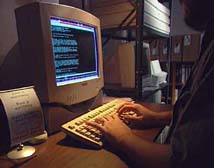Denial-of-service attacks could come during Y2K weekend.
Published:
31 December 1999 y., Friday
As the pre-Y2K hype enters its final phase, computer watchdogs have identified twonew techniques for bringing Internet sites down: One of the denial-of-service attacks is nicknamed TFN2K, the other is called the "Mac Flood Attack." Neither of them is directly related to the Year 2000 computer bug itself, but the failures they cause could be misinterpreted as New Year_s glitches.
TFN2K is a variant of a previously reported denial-of-service attack known as TFN or Tribe FloodNet . The attacker can make it look like data requests are coming in from multiple sources - which makes it harder to track down the source of the attack.TFN2K adds another twist by intentionally sending data errors "designed to crash or introduce instabilities in systems," the center said. CERT advised system administrators to follow industry guidelines to guard against denial-of-service attacks, and to install filtering software that recognizes when Internet traffic is coming from bogus sources.
The second attack strategy targets Apple Macintosh computers running the MacOS 9 operating system with full-time connections to the Internet (under some conditions, systems using MacOS 8.6 also may be vulnerable). John Copeland, a computer engineering professor at the Georgia Institute of Technology, reported that an attacker could send relatively small amounts of fake data in such a way that the Macs would be triggered to send larger transmissions in reply.
Šaltinis:
MSNBC
Copying, publishing, announcing any information from the News.lt portal without written permission of News.lt editorial office is prohibited.
The most popular articles
Software company announced new structure_ of it_s business.
more »
 A number of MEPs urged Internal Market Commissioner Michel Barnier to come up with common rules to regulate cross border online gambling in Europe.
more »
A number of MEPs urged Internal Market Commissioner Michel Barnier to come up with common rules to regulate cross border online gambling in Europe.
more »
 Think before you post as once you do it is online forever. That was the message on Safer Internet Day marked on 9 February by a seminar in the European Parliament.
more »
Think before you post as once you do it is online forever. That was the message on Safer Internet Day marked on 9 February by a seminar in the European Parliament.
more »
 50% of European teenagers give out personal information on the web – according to an EU study – which can remain online forever and can be seen by anybody.
more »
50% of European teenagers give out personal information on the web – according to an EU study – which can remain online forever and can be seen by anybody.
more »
 When did the Commission start working on social networking sites?
more »
When did the Commission start working on social networking sites?
more »
 ICSA Labs, an independent division of Verizon Business, is the first independent security-product testing and certification laboratory to earn ISO/IEC 17025 accreditation, validating the laboratory's world-class capabilities.
more »
ICSA Labs, an independent division of Verizon Business, is the first independent security-product testing and certification laboratory to earn ISO/IEC 17025 accreditation, validating the laboratory's world-class capabilities.
more »
 From today, European citizens, businesses and organisations can register .eu website names using characters from all 23 official languages of the European Union.
more »
From today, European citizens, businesses and organisations can register .eu website names using characters from all 23 official languages of the European Union.
more »
 Authorities investigated 301 mobile phone services websites in follow-up to EU crackdown on misleading consumer practices.
more »
Authorities investigated 301 mobile phone services websites in follow-up to EU crackdown on misleading consumer practices.
more »
 After nearly 2 years of legislative work the Telecom Package is due to be put to a final vote in Parliament on 24 November in Strasbourg.
more »
After nearly 2 years of legislative work the Telecom Package is due to be put to a final vote in Parliament on 24 November in Strasbourg.
more »
 The Christian Science Monitor reports that three men have been named as being the masterminds behind the hacking of RBS WorldPay, a subsidiary of the Royal Bank of Scotland.
more »
The Christian Science Monitor reports that three men have been named as being the masterminds behind the hacking of RBS WorldPay, a subsidiary of the Royal Bank of Scotland.
more »
 BAI’s Banking Strategies Insights reports that banks must get serious about improving their ATMs, especially in the area of envelope-free deposit.
more »
BAI’s Banking Strategies Insights reports that banks must get serious about improving their ATMs, especially in the area of envelope-free deposit.
more »